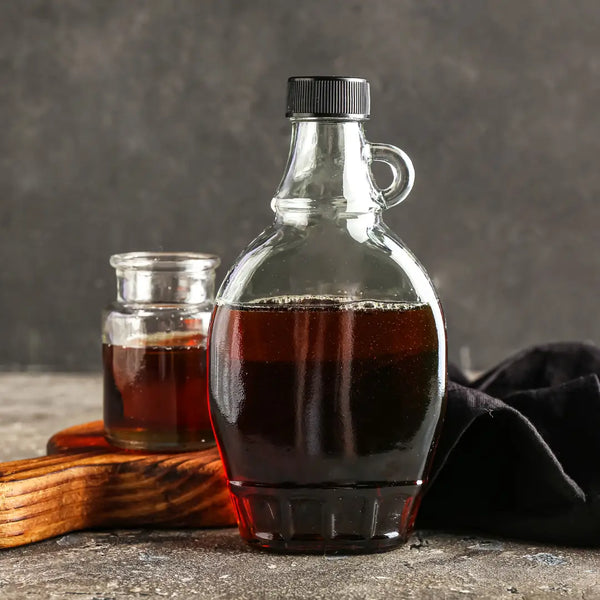Sorghum Syrup vs. Molasses: Understanding the Differences for Distilling
Kristi van der RietWhen it comes to sweeteners used in distilling, sorghum syrup and molasses often come up in conversation. While they may look similar and have comparable uses, these two sweeteners have distinct origins, flavors, and production processes. Let's delve into the differences between sorghum syrup and molasses and explore how each can be utilized in your distilling ventures.

Origins and Production
Sorghum Syrup Sorghum syrup, sometimes referred to as "sorghum molasses," is made from the juice of the sorghum cane (Sorghum bicolor). This plant, originally from Africa, is cultivated in many parts of the world, particularly in the United States. The production of sorghum syrup involves harvesting the mature sorghum canes, stripping the leaves, and crushing the canes to extract the juice. This juice is then boiled down to create a thick, sweet syrup with a distinctive flavor.
Molasses Molasses, on the other hand, is a by-product of the sugar refining process. It is produced from sugar cane or sugar beets. During the extraction of sugar, the juice is boiled to crystallize the sugar. The remaining thick, dark liquid is molasses. There are different types of molasses based on the stage of sugar extraction: light molasses from the first boiling, dark molasses from the second, and blackstrap molasses from the third boiling. Each type has its unique flavor and intensity.
Flavor Profiles
Sorghum Syrup Sorghum syrup has a mild, slightly tangy sweetness with earthy undertones. Its flavor is often described as complex, with hints of caramel and a subtle smokiness. This makes it a versatile ingredient in distilling, providing a unique taste that stands out from other sweeteners.
Molasses Molasses has a richer, more robust flavor compared to sorghum syrup. Light molasses is sweeter and milder, while dark molasses has a deeper, more intense taste. Blackstrap molasses, the most concentrated form, is less sweet and has a strong, somewhat bitter flavor. The distinct taste of molasses can add depth to distilled spirits, especially in rum production.
Nutritional Content
Both sorghum syrup and molasses contain vitamins and minerals, but their nutritional profiles vary slightly.
Sorghum Syrup Sorghum syrup is naturally gluten-free and contains small amounts of iron, calcium, and potassium. It is also a source of antioxidants, which can help protect against cellular damage.
Molasses Molasses, especially blackstrap molasses, is rich in nutrients. It is a good source of iron, calcium, magnesium, and potassium. Blackstrap molasses is often touted for its health benefits due to its high mineral content.
Uses in Distilling
Sorghum Syrup Sorghum syrup is widely used in the production of distilled spirits, particularly in regions where sorghum is cultivated. It can be fermented to produce unique spirits with a distinctive flavor profile. Its gluten-free nature makes it an excellent choice for creating spirits suitable for those with celiac disease or gluten intolerance.
Molasses Molasses is a key ingredient in the production of rum, where its rich, robust flavor is highly prized. It adds depth and complexity to the spirit, making it a favorite among distillers. Molasses can also be used in the production of other distilled spirits, adding a unique character to the final product.
Environmental and Economic Considerations
Sorghum Syrup Sorghum is a hardy crop that requires less water and fewer inputs compared to sugar cane or sugar beets. This makes it an environmentally sustainable choice for farmers. Its ability to grow in diverse climates and its multiple uses (grain, syrup, and forage) add to its economic appeal.
Molasses Molasses production is linked to the global sugar industry. While sugar cane cultivation can have significant environmental impacts, including deforestation and high water usage, sugar beet farming is considered less intensive. The use of molasses as a by-product helps to reduce waste in the sugar refining process.
Conclusion
While sorghum syrup and molasses may share some similarities, their differences in origin, flavor, and production set them apart. Sorghum syrup offers a unique taste with earthy undertones and is a versatile ingredient in distilling. Molasses, with its robust and rich flavor, is essential in rum production and adds depth to various spirits. For a more comprehensive walkthrough of molasses as raw material for distilling check out this article. Understanding these differences can help you choose the right sweetener for your distilling needs, ensuring that your creations are both delicious and distinctive.
Whether you are crafting spirits or exploring new flavors, both sorghum syrup and molasses have valuable roles to play in your distillery. Explore their unique characteristics and enjoy the rich flavors they bring to your spirits.
